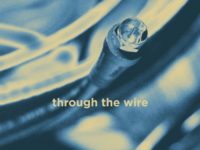Something keeps pulling guitarist David Torn and bassist Tony Levin together. It’s a partnership that blossomed with 1987’s Cloud About Mercury, with drummer Bill Bruford and trumpeter Mark Isham, and, for what seemed like an eternity to fans, felt as if it might be a one-off project. In a way, it was. The two would return together in the late 1990s, along with Bruford, with Chris Botti taking Isham’s place, this time as Bruford Levin Upper Extremities. And then, once again, the group disappeared.
Now, again, Tony Levin and David Torn reunite, but another member has been replaced, with a familiar name. Yes drummer Alan White has stepped in to fill Bill Bruford’s empty drum slot, now that Bruford has retired from drumming.
If it weren’t for White’s sheer talent, it would seem almost like a purposely humorous move, since the two swapped drum chairs in Yes decades ago. And, of course, when speaking of Yes, it’s hard not to think of 1990’s Union, which saw the joining of too many Yes men into one massive GigantoYes, along with some extras who were tied up in those spin-off bands. Tony Levin was among them as bassist in Anderson Bruford Wakeman Howe — and so, in a roundabout way, he too had played with Alan White, but maybe only through the magic of editing.
What remains the same through each incarnation is the beautifully angular approach to music the group takes. While some players change, it seems as long as Levin and Torn are involved, there’s enough DNA there to nearly reconstruct the whole. It’s not as if we’re getting stagnant repeats here, however. Levin Torn White is every bit the “next step” from BLUE’s 1998 album. Lacking the trumpet of Isham or Botti, there is simply more room for Torn and Levin to explore melodically, or for White to construct intriguing rhythms.
In the end, the evolution of the music through these three groups has slowly been towards Tony Levin, for here he takes center stage much of the time, with heavy emphasis on his staccato Chapman Stick work filling both bass and a sort of odd lead duty at times. In other places, he’s found playing his unusual “funk fingers” bass — short drumsticks strapped to his fingers, drumming on the strings of his bass — while in others he breaks out upright bass.
[SOMETHING ELSE! INTERVIEW: Alan White talks about starting over with a new vocalist in Yes, his initial dates with the band, and favorite moments from working with David Torn, Tony Levin and John Lennon.]
David Torn dials in the sounds of alien radio signatures on his guitar much of the time, squealing and weaving in the background or jumping forward with mind-bending solos: It’s hard to say exactly what he does much of the time, but it’s safe to say if it sounds weird, it’s Torn and his electronics. It seems insultingly simple to say Alan White pounds out thick, dense grooves, but that’s exactly what he does. He’s a beast in this setting, a much bigger presence than in Yes.
This is a band every bit as capable as Levin’s old employer, King Crimson, but it seems intent on having more straight-up fun. Eerie opening tune “No Warning Lights” could easily have landed itself on any late-model Crimson album and sounded perfectly home. “The Hood Fell” sounds a bit like a more rock-oriented version of BLUE’s “Etuded Revisited,” and, in fact, that’s one common trait across this whole album.
While Cloud and BLUE felt distinctly jazz-oriented, Levin Torn White feels like the rock cousin to those two. It’s hard not to point out how “rock” this album feels, aside from a few shorter, more Torn-driven moments (such as the soundscape “Convergence.”) If there’s a better comparison to be made, it may be to yet another Tony Levin side project, Bozzio Levin Stevens, who seemed set to take an avant approach to instrumental rock, and just said, “Ah, screw it, let’s just have fun.” (And it is.)
What we get here is the arty mind of the previous Levin/Torn projects, and get-down-groove of BLS. It’ll put a smile on your face and keep you amazed at the weird, wonderful antics these guys are pulling out of every corner of their talent closets. That’s a pretty rare thing in so-called supergroup: They focus too much on the “super” and too little on the “group,” and what you wind up with is a mess.
These guys are consummate professionals, and it shows, but they also know how to just have fun rather than focus on showing off their every lick. And that is an extremely rare commodity in this weird little niche of progressive rock.
- King Crimson’s Brief But Important Double-Trio Era Peaked With ‘Thrak’ - April 14, 2025
- How David Bowie’s ‘Reality’ Stood Out For What It Was Not - September 29, 2023
- Metallica’s ‘St. Anger’ Was Always Much Better Than They Said - June 8, 2023


